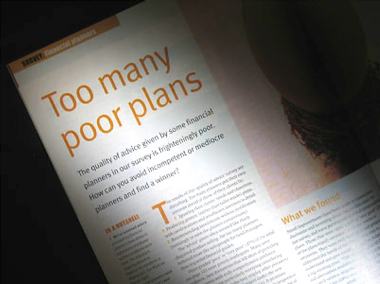Financial Planners
Ensure a planner is working hard for you, not just looking after their own interests – Choice magazine, January/February 2003
Given my training in financial planning, I will be biased and say that I believe a financial planner is the best person to see for a comprehensive financial plan which encompasses taxation, super, insurance, estate planning and investment. Especially the investment part.
For the best advice don’t speak to a bank manager. Don’t speak to a stockbroker. And do not speak to a real estate agent. It is highly likely that none of these people are trained to assess your goals, your tax situation, how much risk you are willing to take on investments and your past experiences with investing to come up with a strategy that is right for you. It is also unlikely that the bank employee, stockbroker and real estate agent will be independent and unbiased.
It is very important that you understand what sort of investment risk you should take to realise your financial dreams, and if this differs from what level of risk you can cope with.
Many financial planners are not independent and unbiased (yep, even lots who call themselves “completely independent”, “family owned” or a number of similar descriptions). You should look around until you find one who really is independent. This means one who does not work for a financial company whose products they are pushing.
How to work out who owns the company where a financial planner works can be more complicated than just looking at their business cards. Many financial planners in Australia work for MLC, Godfrey Pembroke or Bridges. They are all part of the Insignia Financial Group, which used to be called IOOF. Meanwhile, AMP brands include Charter and Hillross.
You should be looking for a planner who does not get paid from asset-based fees but rather charges a fee for service (usually an hourly rate but may be a flat fee for writing a financial plan). This is the best way to be confident that the person giving the advice has your best interests at heart, not theirs. A planner who works for a large company can push products that will give them the greatest takings, even if they know there are better products for their clients available.
Asset-based fees are effectively commissions by another name. These are fees that come out of your investments calculated as a percentage of the money you have with the financial planner. Think about this scenario. Two people have exactly the same financial situation except for one thing – one of them has $200,000 to invest, the other has $2,000,000. If these two people are given exactly the same advice and are invested in exactly the same assets (as you would expect) the person with $200,000 would pay 10% of the fee of the client with $2,000,000 – 10 times the price for the same advice.
Asset-based fees are also an incentive for planners to retain more of your money in an investment under their management (so they can get a cut of it) rather than advising you to, for example, pay off more debt (where they won’t get a cut).
The financial planning profession has had its fair share of bad press over the years, a great deal of it completely justified. Too many people were ripped off and screwed over before the federal government changed the laws that cover what planners can and can’t do. Legislated in the dying days of the Labor government in 2013 was a ban on commissions for new recommendations of products to clients, and laws stating advice must be in the client’s best interests. There were a few catches. It did not mean an end to asset based fees, and commissions can still be charged on products that clients have held since before July 2013, as well as on all life insurance products held outside of superannuation (commissions make up between 30-43% of the premium for life insurance products). Unfortunately, the Abbott government watered down these laws. They were the best that consumers had ever seen in relation to financial advice. The changes removed the ‘best interest duty’, so planners don’t have to act in the best interest of the client.
Many financial planners are little more than glorified sales people who must comply with their company’s recommended list, consisting mainly of their own products examined by their own research departments.
An independent financial planner is worth the search, even if it means a little more looking.
Meeting with a financial planner
Some questions to ask a financial planner before you start giving them all your financial details are: Are you licensed? Do you offer a comprehensive service or are there areas of financial planning or strategies you do not cover in your plans? What qualifications and experience do you have? Who owns the company you work for? Are there any products you are obliged to recommend or any you are not allowed to recommend? How are you paid, by commission, asset based fees or fee for service? Are there any insurance products you recommend that you receive a higher commission from than others? Are you under any incentives to advise a client does not sell their investments or invests more of their money in your platforms (in other words do you receive bonus payments from your employer for certain dollar amounts or percentages of client’s assets retained on, say, a monthly basis?). And: do you offer ongoing reviews for your clients, and if so, what is the cost for this service?
But the best question to ask a financial planner is probably this: “Are you wealthy from following your own advice?”
Most of these questions (not the wealthy one) can be answered by reading the Financial Services Guide which you must receive before the planner gives you any advice. If they do not give you one of these guides, walk away. If they do not hold an Australian Financial Services Licence (AFSL), or if they are not an authorised representative of a licence holder, walk away. If you want to check if a firm holds an AFSL issued by the Australian Securities and Investments Commission or if an individual is an Authorised representative of a licence holder, do a search with ASIC. Don’t bother searching for my licence on the ASIC site. I will take this opportunity to remind you that I do not hold an Australian Financial Services Licence, nor am I an authorised representative of a licence holder. That is because I do not give financial advice or advise on individual products. The information I give is of a general nature – as it says in that annoying disclaimer that pops up when you click on the Introduction page. If for whatever reason that’s not working, the same info is at the bottom of every page in this course.
If you see a financial planner, what should you expect from the meeting? The first thing they should want to do is sit you down and ask about your current financial situation and past experiences with money. They should want to know as much as they can about your income, expenditure, current assets, current debts, your superannuation, tax position, how much risk you have taken with investments before and how much you are willing to take now, your current insurances and most importantly they will want to know what your financial goals are. Pretty much the sort of topics we have covered here, except that it’s very unlikely they will cover gambling or saving at all and they will not emphasise debt elimination to the extent I have.
You should have at least three meetings with a financial planner: the first where they get information from you, the second where they present their recommendations to you in a written plan (which can be anything from a couple of pages to a small novel), and the third meeting where you go ahead with implementing the plan and filling out the relevant forms.
What happens if you saw a financial planner years ago who recommended you put money into a managed fund that you still have, yet you have not seen the planner for any advice since? If the planner charged by commission, you’re probably still paying in the form of a trail commission which could be hundreds of dollars a year. This would still be the case even if the planner has retired. Or died! If you want fees refunded to you, Trailcap is a good place to start.

Shonks
Like any profession, financial planning has its fair share of shonks and crooks. When Choice reviewed financial planners they revealed an industry packed with planners who are not interested in clients with only small amounts of money, and planners who neglected to include major parts of their client’s plans.

Unfortunately for the consumer there is no sure fire way of picking a really good planner based on their academic credentials. The highest designation given to a financial planner in Australia is to be a CFP (Certified Financial Planner). One of the consumers looking for advice in a Choice review actually had a Certified Financial Planner who tried to sell her the Amway scheme. Needless to say, Choice didn’t give the industry a great wrap.
There are also many planners who would stop at nothing to get their hands on your money, even if it means committing fraud. I have read many articles about former financial planners, who illegally obtained their clients’ funds, being sent to jail. Come across one of these dodgy planners and want to complain? Go to the website of the Australian Financial Complaints Authority.
The following clip is from an ABC news story showing a worst case scenario where people trusted financial planners and lost a great deal of money.
Although they may not be totally independent, financial planners listed on the Responsible Investment Association Australasia’s website are all certified by them as having undertaken training in ethical investment, and all of them offer advice for ethical funds and/or ethical shares. There are listings for all states and the ACT but not the NT.
After seeing that video you can be forgiven for thinking it’s hard to find a financial planner who you can trust. Unfortunately, I’m not in a position to give a personal recommendation for an individual or company because I have not received financial advice from planners right around Australia. But if you search for a fee for service planner who you can understand and who also understands you, then you have the best chance of getting good advice. Failing that, get onto an independent planner via the Profession of Independent Financial Advisers, who offer a service via video conference if you don’t live close by to one of their members.
Well, for those of you without kids, or not planning on having them, that’s just about it.
The remaining information in this course consists of the five sub-topics in the Kids And Money topic. If you don’t have kids and don’t reckon you will have them it’s not a must read. It’s humorous, but you will get by ok without reading through it. But for the main part of the website, that’s all.
I don’t expect you to remember all the stuff in this course, but if you take note of the following rules, your financial freedom will follow.

- Don’t gamble.
- Set realistic goals.
- Don’t borrow money to buy items that can only ever lose value.
- Pay off non-tax deductible debt as soon as you can.
- Spend less than you earn and save the difference (at least 10%).
- Invest in suitable assets, remembering that higher expected returns = higher risk.
- Diversify your investments.
- Roll all your super together and invest it wisely.
- Insure your assets and yourself.
- Make a will and sign an Enduring Power of Attorney.
- Seek independent professional advice.
When you see all those points written down like that it looks like a hell of a lot of work, but many of these are a once off, like rolling all your super together and signing an Enduring Power of Attorney.
If you are not going on to read the Kids And Money topic I will leave you with one final thought. No matter how big your goal, no matter how tough you choose to do it, no matter how many peanut butter sandwiches you eat and desires you give up on the way to your own financial freedom, please remember this…
Money is a means to and end, not an end in itself.
Thank you very much for reading through Financial Freedom for Gens X and Y, and please help me to improve the course by giving me some feedback by clicking on the “Ask a question” tab on the top right.
If you liked this course and thought it was worthwhile, please send the link for Financial Freedom For Gens X and Y to all your friends. Actually, send it to all your Facebook friends, that way you send it to people you like, as well as those you work with. If you didn’t like it, please let me know why.
Your homework (“Homework! You can’t be serious!” I hear you cry) is to achieve the things on your list of goals.
Thanks again,
Nick